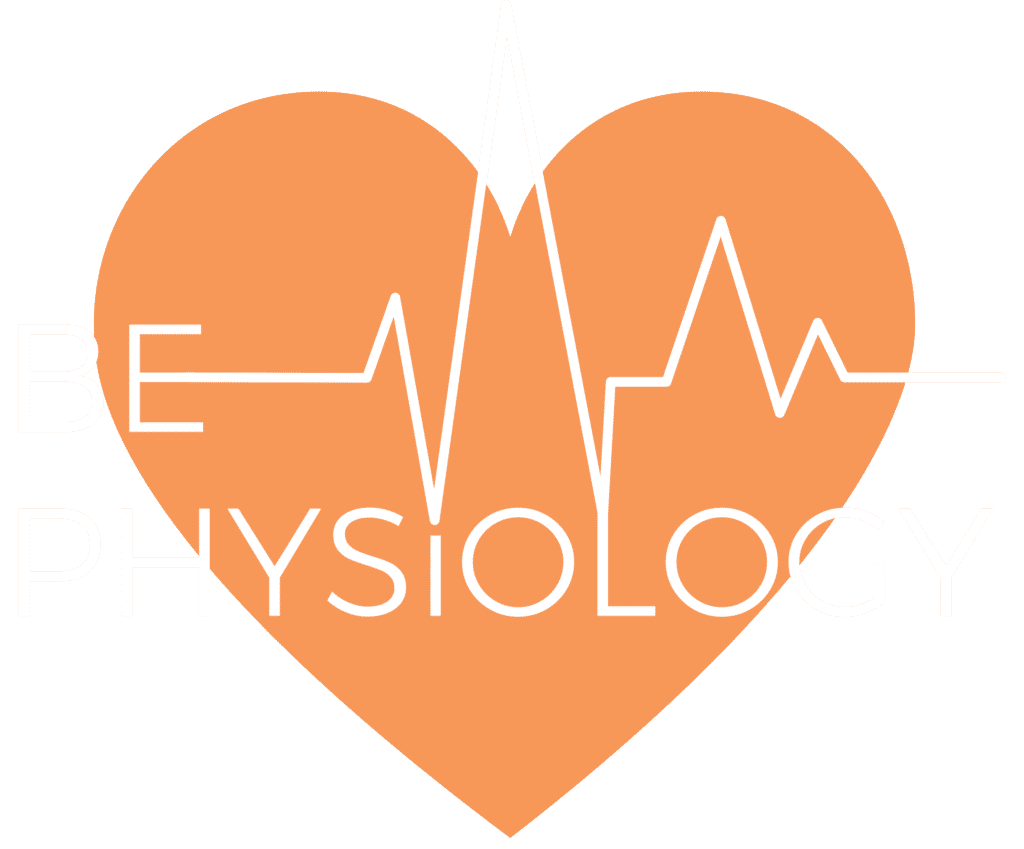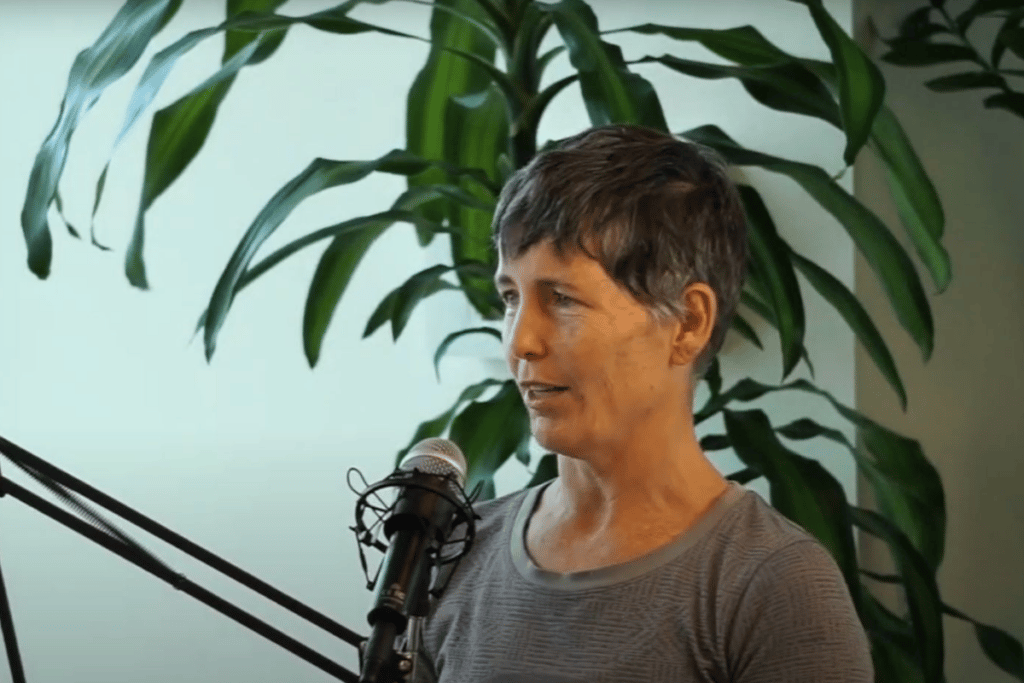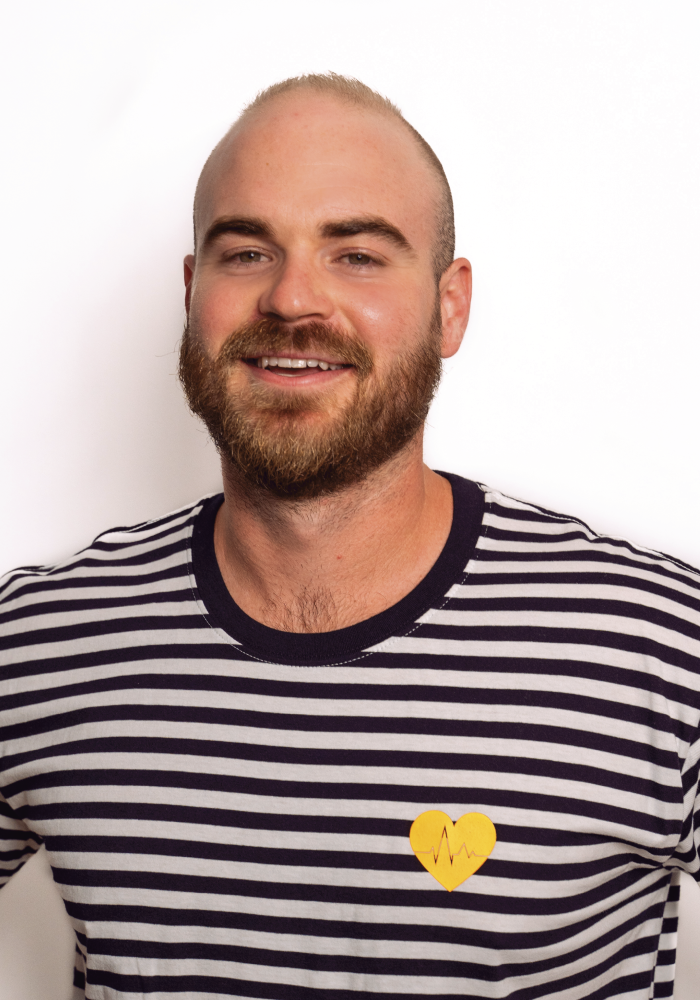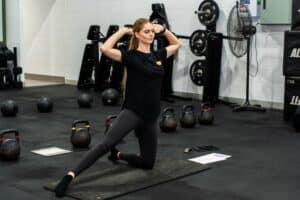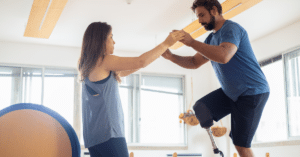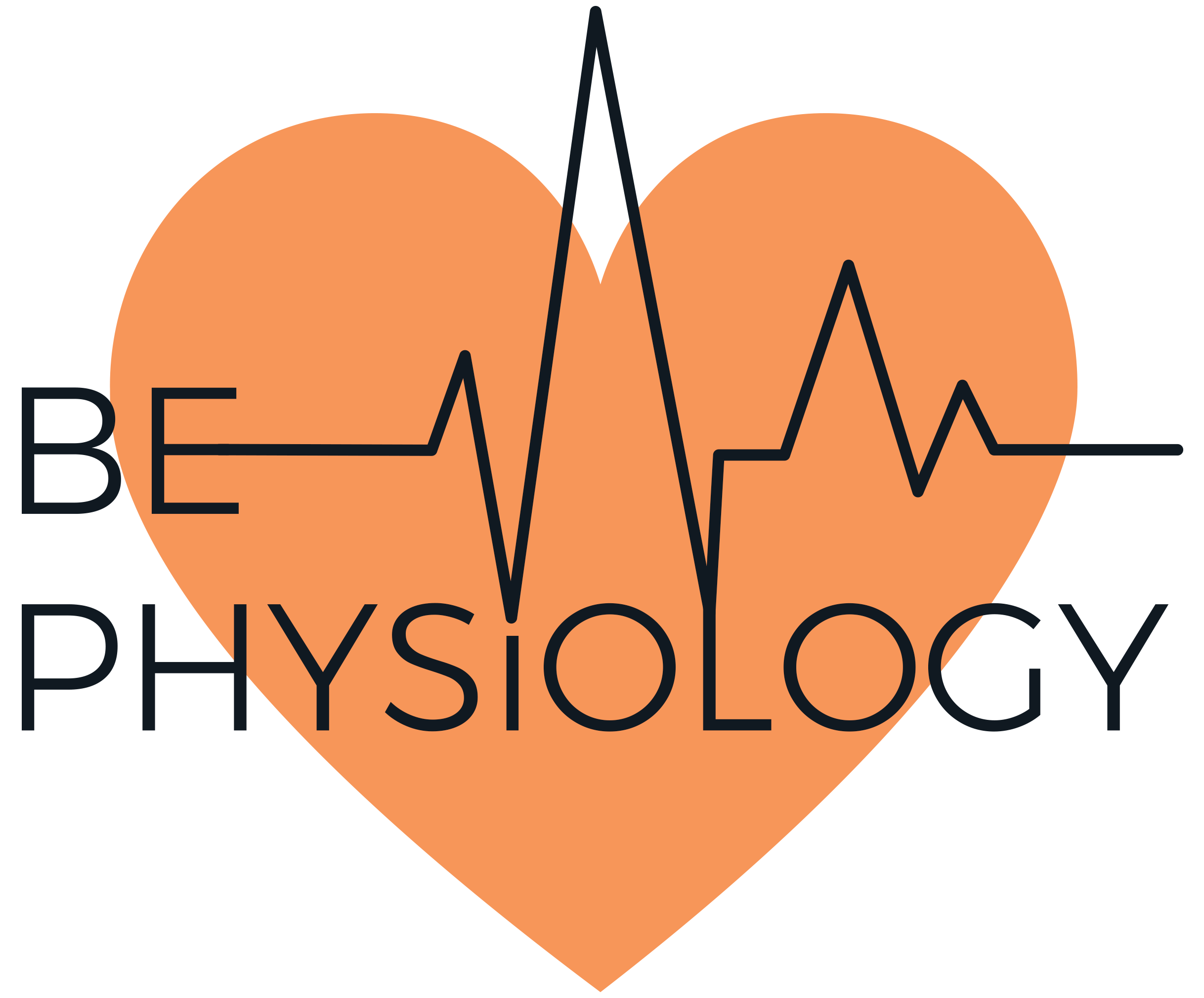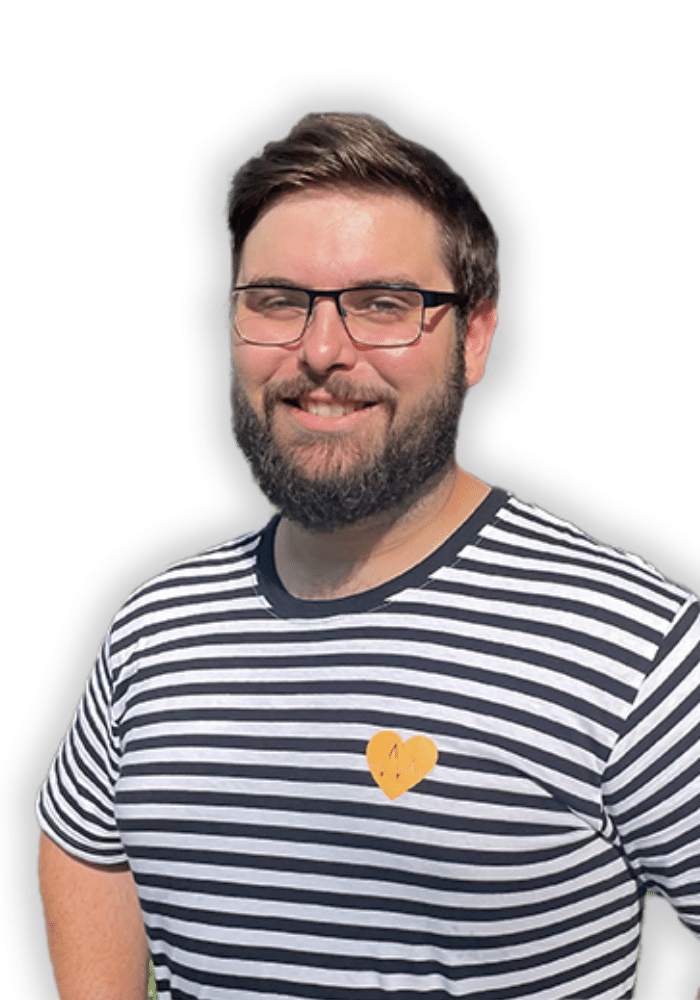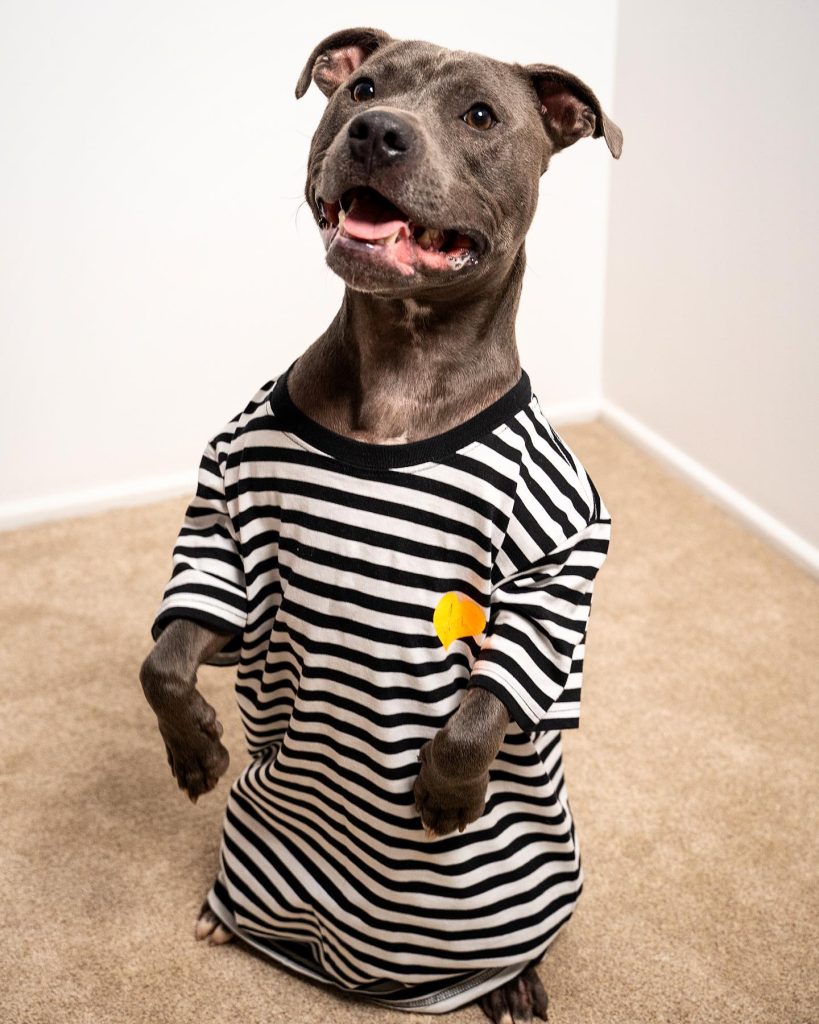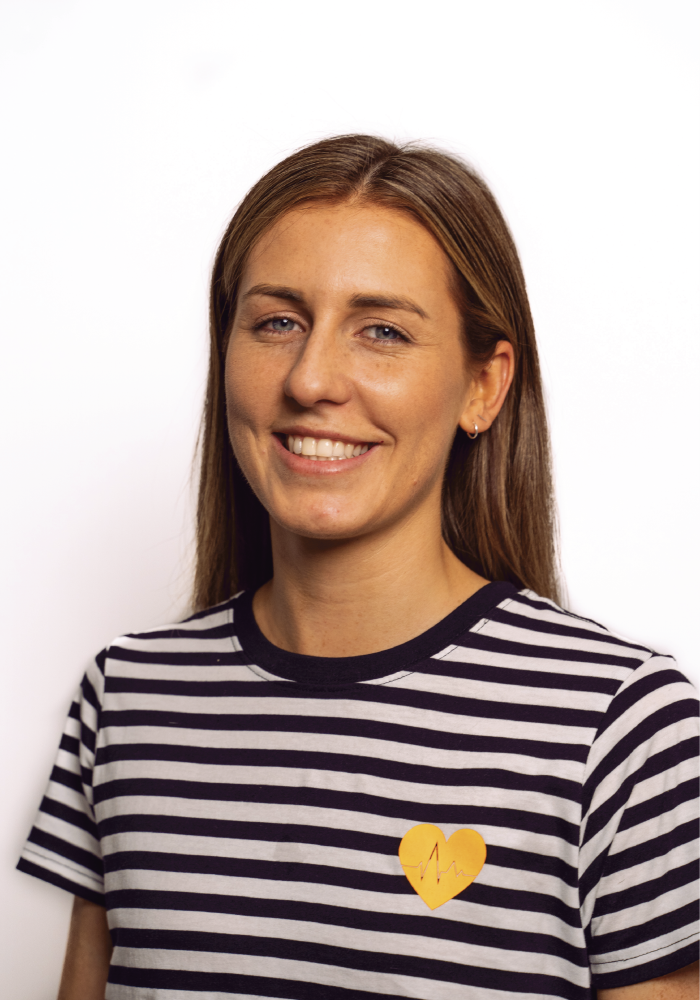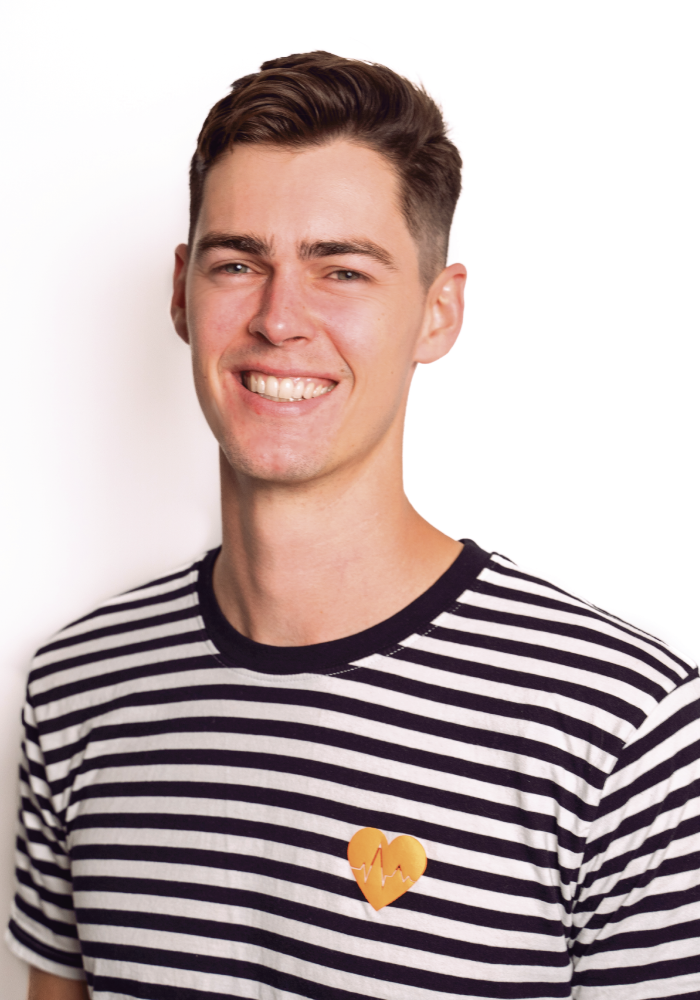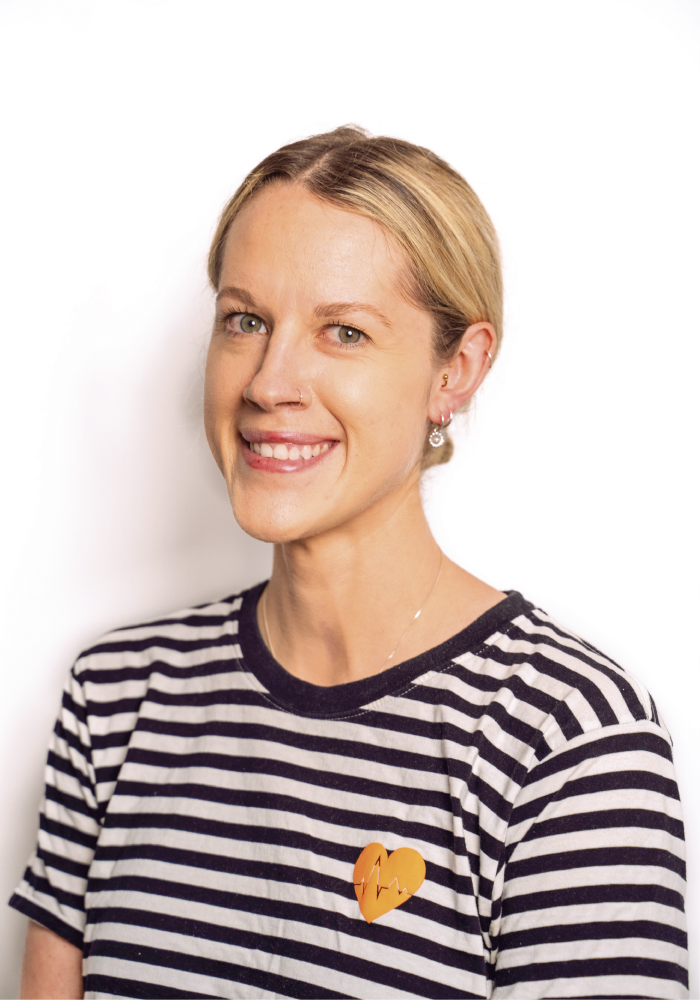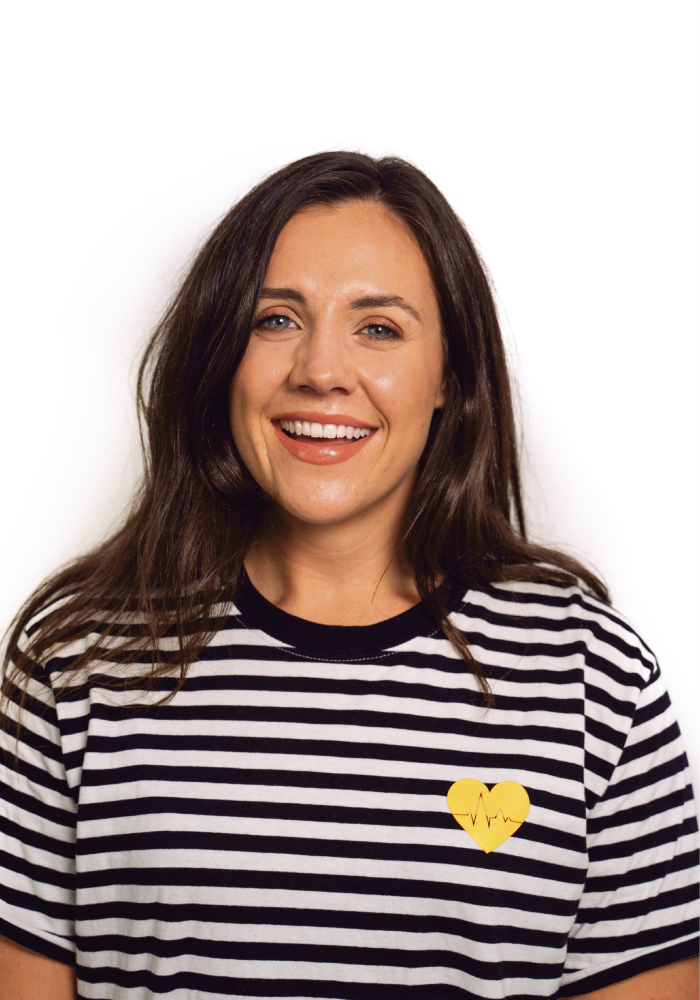While at a social event, Emma took a nasty fall off a balcony. She suffered a severe brain injury and completely lost the use of her legs (temporarily, we might add!).
Emma was in the hospital for months following her back surgery, and she spent the time navigating post-traumatic amnesia and her major back injury. But Emma’s determination meant that, despite such major injuries, she wasn’t going to let these new challenges stop her from moving forward!
Emma, we discover, was born adventurous. Growing up in PNG meant she experienced life barefoot, out in nature, and next to a crocodile farm (yes, you read that right). She was still adventurous when she moved to Australia, and nothing changed after her accident!
If you think someone who uses a wheelchair is limited in their daring pursuits, think again. Horse-riding, scuba diving, quad bikes…the list of Emma’s active hobbies goes on! Emma talks about how using a wheelchair has affected her social life, shares what it’s like living with constant chronic pain, and evaluates the transition from one exercise physiologist to another. It’s especially tough when the physiologist in question overuses the words ‘um’ and ‘like’.
Get ready for a great conversation in today’s episode of Be Stories, where we chat to Emma and she puts up with our company for a whole hour!
[activecampaign form=22 css=1]
Transcript
Hello, and welcome to another episode of Thea podcast with B physiology. So sit back and enjoy this episode of B stories, where we get to chat with Emma about her journey after a spinal cord injury and navigating different stages of her rehabilitation. Emma. Thank you so much for joining us today on, Be Physiology podcast, the UNAWARE podcast.
First question we ask all of our podcast guests in our studio. Can we call it a studio? I’m gonna call it a studio. What do you think of his energy by the way? It’s it matches the flash studio. it’s it’s amazing. I’m feeling pumped. Who needs a coffee? Yeah, exactly. Yeah. Coffee is inbound, but first question is…
What would be the name of your autobiography? The only way is up is one, but that to me is a bit of a reset phrase because I’ve gone down so many times. I have to tell myself again, the only way is up. On every day, that’s different, that’s a different autobiography because it depends on how strongly I can beat the challenges.
So daily, the only way is up there is more than a daily. The only way is up an hourly. Well, it depends if I’m in the middle of a Be Physiology exercise regime, it’s by the minute. Ah, okay. We’re gonna edit that out. Compliment. Take that positively. Yeah. Every minute with us is the faster I get up and stay up the sooner I can leave these guys high energy.
That’s what we’re after. Well, the only way. Up. Okay. Seems a little bit somber. And a little bit, um, challenging. It’s not, it’s not when you’re sitting on the ground because you’ve just fallen out of your wheelchair again. okay. Yeah. Yeah. Fair. Okay. The only way is up. Yes, it’s a good one, there’s many. Okay.
But that was the one that first comes to mind. We can unearth a couple more. Okay. Throughout that really discussion maybe. Okay. We’ll try and do that. If we. That good. probably not. We’ll see. can you give us a little background of your life? Background of your life. Wow. You know, is this the elevator spiel or because like they’re tired your life into an elevator spiel…
Let’s just say you’re in the elevator for a while. You’re stuck in it. so you’re stuck and you’re stuck with us. So very lucky. Wow. My superpowers would come through and I’d be up through the manhole, scaling the cables.
Um, okay. So yeah, born and bred PNG. So I had a pretty amazing life playing in storm water drains and friends with crocodile farms and all sorts of things, it was pretty good. We lived in the bush for a while which was very remote. So freedom was incredible. I think the lack of shoes was a very key part of that and living on the beach.
So, you know, I’d walk down the front stairs and you’d be in the ocean. There was a lot of water life. And I learned to scuba dive when I was 11. So there’s been a lot of underwater journeys in my life. Um, I was a dive instructor for a while after school, best diving in the world in PNG. Yeah. It’s amazing.
One of my favorite dives up there. Really? Yeah. So there’s a dive spot called the submarine base, which was a submarine base in Wolrd War II, where they used to hide the submarines in the wall of the cliffs underwater. And it’s, um, you know, 104 meters is not the bottom of that wall. And the fish swim vertically.
And then when you thin out from the wall, it’s just this big blue, and every now and again, a turtle will come past or a shark will come past. And it’s just, it’s incredible. It sounds cool. The shark thing has got me less keen than the start of that speech, but not as scary as a crocodile. Yeah, yeah. I can imagine.
Yeah. So yeah. So after Guinea, I did a little bit of traveling. I worked in Sri Lanka for a little while. Did a lot of great stuff without a lot of money for scuba diving. Good coffee for you, by the way, Emma, thank you so much. Thank you. Pretty lumpy. Wonder inside joke inside joke. Yeah. And then, yeah, I, um, had the ultimate surprise and well, one of the many surprises of my life and found out that I was pretty pregnant.
um, pretty pregnant, pretty pregnant, like 19 and a half weeks. Right. And went into hiding and, um, My family found out. My mom was the first one to find out when Freeman was two weeks old because I was not keeping him. I, you know, was a dive instructor. It’s not a life for a person with a child mm-hmm and, um, it’s a life for somebody who’s, you know, living a lot of fun.
So I just didn’t think I could be a mom to him for his own sake. And he probably agrees with me still I was gonna keep him up. Yes. Um, yeah. So after that, I moved back to New Guinea because I recognized that I was easier to do it with my parents than on my own. And Freeman had the best life for the five years that we were up there, but then two volcanoes erupted and destroyed our town.
So we had a lot of refugees living with us and we had. No food, no police, no army. No, just nothing. And I was trying to finish a law degree at the time, which just went to cactus because there was no postage, no phones, no law library. And I didn’t really like the degree anyway. I was gonna say a diving instructor and a lawyer are like a bit of a mix. Yeah. It is a bit of a mix. Yeah. Yeah, yeah. I can tell you one’s fun and one’s not. Yeah. Okay. But we’ll leave that to the viewers. Yeah. yeah. Yeah. That’s my personal opinion. But I came down here and I got into it world for 15 years or so. And I was, you know, I got married and Freeman was growing up and I was a CrossFit junkie and I did a lot of diving and.
Had a pretty good life. And then, 2013, I was at a friend’s for lunch and I fell off the deck and died. And then spent six months in two very different hospitals and was basically meant to be a bedridden vegetable with tubes and am still doing a lot of work to prove them wrong! My aim is to get outta my chair.
So, you know, June 2013. I lost my legs temporarily. It’s very big temporarily, but it is temporary. Then I got out of the hospital, my dad died a month after that. So I was back in there looking after him. And then after that, I fell outta my wheelchair and broke my hip and spent six weeks in hospital.
I’ve had a couple of bouts in hospital for spasticity and hypertonicity, I’ve done, you know, all sorts of trials with Botox, um, serial casting, all that stuff. Um, had a pretty nasty divorce and now I’m. Two years post that, and life is pretty good. That was such a wrap-up of your life. Just, yeah, it’s a big life.
Yeah. I mean, we’re gonna delve into little parts of that now. So just to take you back. Yes. Had the injury, yes. Went to the hospital, you said it was two different hospitals. Yes. What’s the process like, what was your process through the hospital system? What was it like for you? Okay. So we’ve gotta understand that I died and I had to get brought back to life.
Mm-hmm they kept me in an induced coma for two weeks because can you, sorry. Do you remember the, so this is this, so this is the thing too, that we need to understand is that. My injury was in June when I came when my memory doesn’t really start until October because my brain injury really impacted my memory.
I remember saying, man, I really hope something good happened in the first half of the year because the second half’s been pretty awful. And I don’t remember, we flooded, don’t remember it. Um, some other really big events happened in the first half of the year that I just have no memory of. So I don’t, you know, for me to say I died.
Doesn’t mean anything to me really, because it’s for me to comprehend how big that trauma was, it’s hard because I just, I don’t remember it. I don’t have any memory of that experience. I’m sure my system does, but I don’t. So it doesn’t have that effect on me when I say it.
And so I spent two weeks in, in I, in a coma because they weren’t gonna do my back surgery because my brain injury was, so the swelling was so severe and I’m getting all of this second hand. And some of it took years for me to learn because we just didn’t talk about it. Um, so I did that then my big toe moved.
So they did my back surgery. And I was in the IBH for a month. Apparently, I was a bit angry. Apparently, I was in restraints because I kept ripping all the tubes out because I didn’t need them. Is that true, mom? I wouldn’t even go. Apparently. The nurses had me in my own room, but they had to move me close to the nurses’ station because I kept going downstairs at RBH to the coffee shop to have coffee with all my friends.
I didn’t have any friends at the RBH I was just bored and angry and the nurses were worried that my new friends would take the drip out and take the toxic drug bag and ping off and have a great time with it. Yeah. Right. So they put me in the bed closest to the thing, and I kept sneaking into the elevator and down the stairs to go and have coffee with my friends.
And you were getting away with it. Yeah. Good on you. Oh, look, I was impressed. Had I been bored. You probably made a few friends. I might’ve. I dunno what I don’t remember. Can’t remember. I don’t remember. And then I went to acute in the spinal ward at the PA because I had post-traumatic amnesia. Um, so I was in acute for a month and then I went into the general ward and I left that at the end of November.
What’s that process like on the actual medical side of things? The PA spinal unit needs an upgrade. Okay. You know, the benches are not at spinal Heights. Mm-hmm, , we’re not allowed to use knives, so you can’t get you, it’s so underfunded and overworked and understaffed that it’s really. For the hospital to give anybody the skillset to do anything, but go home and get ready for the spot care team and get ready for everybody else to teach them how to live their lives in a wheelchair, because they just don’t, they don’t have the capacity.
What are some of the most immediate or instantly recognizable things where you felt like you weren’t up to scratch coming outta hospital? I really didn’t know how to use most. So I’m scripting a wheelchair to use for the next five years minimum because there was no NDIS then, so I’m scripting this wheelchair to live in a world that is completely different to me.
You know, all of my friends have got Queenslanders. We live in Queensland. My driveway’s on a bit of a slope, so I’ve got $9,000 worth of paint damage to the side of my car. We weren’t prepped for any of it because they just don’t have capacity. No one knows why everyone’s life is so different.
It’s very hard for them to give you the skillset to go back and, and slot back into the world. Cuz that’s what I wanted to do. I wanted to slot back into the world and have as little impact on people yeah. As possible. And it’s it’s it. You can’t. When your whole world’s been turned upside down, you can’t have any impact.
Yep, absolutely. Your, so when you say, you know, you, you’ve come out of the hospital, but was there any particular, professionals, was there any particular professionals that you remember playing a hand in your recovery or anything like that? Anyone that stands out, but obviously memory’s gonna be an issue, but yeah.
Do you know what is really interesting to me is that there has been nothing with the brain injury unit. Since I’ve left the hospital. So no checking in nothing reassessing and I’ve dodged a massive bullet with my brain injury. Mm-hmm considering how severe it was. My memory is really the only thing – my sense of smell are the two things that I really recognize as being, really affected.
And this is memory after the fact now. So like things happen after the injury. I can’t read a book. Yeah. Okay. I can read a book. And I can read it again and again and again, I can see a movie, and by the time that sounds great. I’ve dreamed that well, I’ve I really struggle to read because every time I pick up the book, it’s okay.
I’ve gotta go back a few pages. Yeah. And I’ve gotta work out what the hell I was reading. Mm. So I’m going from reading three to four books a week to really struggling with reading. I struggle with movies. I’ll go and watch a movie. And I, by the time I get home, I could watch that again because I don’t remember how it ended.
Mm. So, and it’s very hit and miss it’s, it’s a bit random. My memory, um, in the unit. I was sneaking out three times a week to go and see a bone therapist. I was going out once or twice a week to go to my turn rehabilitation. And Jenny and Holly at my turn were exceptional. Oh yes. Yeah. I know Jenny. And it was, it was in an environment where they worked with people. It was, it was where I had the experience of working in a community that was trying to make people better than the wheelchair, better than the ailment, better than the trauma, better than the disability, and get them into a better quality of life and get them moving forward.
Rather than stagnating at the hospital. There was a lot of stagnating and, and Nick Heenan was my physio at the hospital and he was great. He was a lot of energy and a lot of entertainment, but. You know, you’re in this tiny little physio room with my, with a lot of people, they wouldn’t let you really go in and work on your own because they just didn’t have room.
Hydrotherapy wasn’t really used because they just didn’t have the capacity. Is it fair or unfair to say that, like you speak about my turn and how great that was? Yeah. Obviously, that’s setting you up for bigger things, but is the role of what, of the people who are working with you in the. essentially just try to set you up for that point and be able to go onwards.
Like, is it fair to put the responsibility of developing all of those skills and whatnot on the hospital itself? Or could you say that it’s more their job just to like get you to a point of them being able to build external to the hospital? I think it’s very, very difficult for a public hospital system and a small component of a public hospital system.
That is the only channel for spinal injury in Queensland. If they wanna, if they wanna be recognized for funding, they have to go through the spinal unit. And I mean, you guys know, and I think most people do know that just because you’re in a wheelchair, that doesn’t mean anybody understands what’s wrong with you.
There are so many different reasons to be in a wheelchair. I know a guy who’s got PTSD. There is nothing physically wrong with him, but his legs, anything below his waist just does not work because he’s so scarred from his experiences. So how do staff in a small environment, in a public hospital, prep, every individual person to go out and do whatever their individual goals are?
And guess what? Those goals change like my goal to go home and try and be in that life that I had before. What I, you can’t go back once you end up in a wheelchair, you can, it, you know, you can’t go back anyway. It’s already happened. You’ve gotta go forward. And it’s very hard for a hospital to get every person ready to go.
Yeah. Do you think that the fact that your memory was obviously affected, made it, maybe delayed your ability to get to that mindset of being like you can’t go back and you’ve gotta move forward? That, is that hindered at all? When you’re sort of jumping? It’s not my memory. That’s, that’s, that’s had an influence on that journey.
It’s the journey itself, you know, recognizing it’s, it’s, it’s really traumatic to go back into a world and recognize that it’s not your world. That you need to find a new world. And that takes a long time. That’s taken me years to come to that realization because there’s been a lot of effort put into trying to be in that world and trying not to be needed trying not to need help on that point.
How did you find people? So after you’ve left the hospital, mm-hmm, , you’ve done this initial rehab stuff. You’ve you’ve. Now, as you said, trying to find your way in a world that you are actually not accustomed to at all. Mm-hmm, how do you find people adapted to you? Yeah. Coming out of the hospital, none of the problems was how people adapted to me.
The problem was. Okay. And what I wanted, how I wanted people to adapt to me and how I, how I wanted people to not have to adapt to me. Yes. So when I, you know, in hospital, I had the bubble, I’ve gone to physio so often that I got kicked out because I just, I was just, I was relentless. I’m one of those. And while I’m going to physio in the hospital and I’m also doing the external stuff, so here’s my bubble.
Right. And then I leave the hospital and and return to my bubble. So I’m gonna return four, five times a week. Mm-hmm and that’s my that’s. That’s where. I don’t. Yeah, I’m so busy focusing on my journey of learning to walk and my legs are gonna work no matter what, that I don’t think about everything else.
And then the, my bubble kind of comes to an end because I find neurophysicist. So I do that for two years. So I’m traveling to Ravina five days a week to work at least two hours in the gym because that’s another bubble for me. Yep. And then after neuros, I find the making strides bubble mm-hmm and I live in that bubble for a little while.
And that’s where things started diluting a bit for me because it’s, I started realizing because I’d go to making strides and I’d go to the creek in the morning and I’d hang out with all the tally tragics and they’re tragic because they swim through winter and you know, the 87 year old runs marathons, he runs the Boston marathon.
They’re completely mad. Mm. Um, but the, you know, someone would carry me down to the water. I’d have a swim and they’d carry me back up. And my joy of being in the ocean over road. My discomfort. I’ve been carried by strangers. Yeah. Or, you know, Maddy, what’s his, the Maddy, the rugby league player. Matt, is he the really fit tattooed?
Yeah, I think Mattie Rogers Rogers. So his fitness group goes down there. And they’re carrying me down. On the gold coast, my son carries down a 78-year-old bloke. Finally convinces me that he can carry me down and he does, I can do it. Emma put me, and there’s no one else here. You know, where’s the way I came into water.
And he says, so how do you swim? And I went while I use Paul stroke because I can’t use my legs. And he goes, oh, so do I, because I’ve gotta save my legs for rugby training. This me eight year old said what sort of rugby training? He says I play rugby league. And I said, oh, my son plays union. But he has just had his cheek reconstructed.
Yeah, that happened to me a couple of years. Okay. And you are still playing rugby. You kind of looking at the future, your son, maybe you can carry me down the beach anytime, but, but I can’t, I can’t do that anymore. I can’t, I can get driven down by the lifeguards, but, but not being able to get on the sand and go to the beach has hit me harder now than it did.
Four years ago when I was being carried down. Okay. Yeah. Right. So, and do you still get, get down to the UR a bit? Not very often. How about the coast in general? Not very often at all. And you were doing a lot of that for like different, parts of your rehab. I was kinda making strides. And what, and that was before the N D S did you say, or N D I S kind of started, so I did making strides for a couple of years.
It ended with COVID because Alex moved to San Diego. Gotcha. And Alex is an. Yeah. Yeah. Who is a friend, but yeah. Yeah. A good bloke. Yeah. Um, an amazing chef and an EP and he’s intelligent and he’s stopped describing me. , you know, he’s yeah. And he never says arm and he never says like, and he never says, if I was being honest, I’ve never met him.
Therefore he does not exist. So it sounds like a fantasy. Yeah. So that being said, you are, you are one of, probably the most active people. I know. Full stop. Okay. So you are always doing things. Yes. You’re always looking for something to do, finding a group to maybe join. Yes. this, that, so obviously after having an injury and you were like that before your injury anyway, mm-hmm do you think?
Yeah, but there was a lot more social activity because, you know, I was a lot more social. I instigated a lot more social activity because that was what I enjoyed and I still enjoy it. Now it’s just too hard because there’s so many other things I have to consider. Mm-hmm, that? Yeah, it’s very, it’s very hard for me to instigate that.
Can we go into that tiny bit deeper? What kind of things would, deter you from attending more social activities nowadays? Accessibility. Yeah. Okay. Being able to go to the bathroom. Yep. the thing about being in a wheelchair is, and, and you don’t really realize it unless you think about it, but you are constantly being looked down on because you are constantly lower than everybody else.
Yeah. You know, I came across a couple of friends the other day who was sitting in a park having a picnic with their dog. And I was like, wow, I really like sitting here talking to you. I’m looking down at you. It’s a really, really unique kind of thing. Yeah. So. Not only are you always being looked down on, but if you are talking to somebody without cranking your neck, you’re looking at a crotch, not the best view.
No. And if you detract yourself from the crotch and you look up at the person you’re looking up at their nostrils, I tend to aim for the crotch with my eyes. Well, I know, but I’m a female. I don’t do that. I like to think about engaging the upper brain, not the lower brain. oh, we have an upper brain. I do, crazy.
So what kind recommendations for cuz you have been trying like you branch out and you try different things all the time. Mm-hmm what kinda recommendations do you have for people who use chairs, not using chairs? I, what things think it’s really important to rock your system? Mm-hmm, I think it’s really important to go out and try things and be a little bit.
And I don’t think that’s a wheelchair thing. I think that’s a, that’s a life thing. I think you have to constantly challenge yourself. And the thing about being in a wheelchair much as I hate it, I’m also incredibly grateful for it. And the thing about being in it is that it’s not hard to find something to challenge me.
You know, I go horseback riding. And I go horseback riding on a horse where I get thrown on like a S of potatoes. And I slide off with almost as much grace and I’ve been bucked because the horse I was riding had colic and I that’s post-accident that I’ve been bucked. I’ve been bucked a lot before. It’s amazing how long.
I’ve been trying to get in a wheelchair, but yeah, so, you know, and, and that was really scary, but I got straight back on the horse and kept riding. Cause was that the first hobby that you took on or like, what was the first hobby that you said you gotta push yourself, be on the point of being scared and like, I think horse riding was the first one really S diving.
That’s a brave one. So scuba diving was the second one. That, that was hilarious because I did the Seaway at the gold coast. And, you know, before my accident, I was a sinker. I didn’t need, I didn’t need to use a weight belt in your Guinea when you put a wetsuit on, you have to. Um, so we go to the gold coast Seaway and we get all kitted up and I walk up the 13 stairs and walk down the 13 stairs and scoot my backside on the concrete, get in the water and we get to the descent line and my legs won’t go down.
So I throw my fins in still won’t go down, throw my booties in. Still won’t go down. So I wrap my legs around the descent line and go down. I think I saw one fish because every single time I wrapped my legs around the descent line, my dive buddy thought, oh my God, there’s something wrong. So she untangle them.
So I’d wrap them around the descent line and she doesn’t tangle them. We were laughing so much by the end of it. We couldn’t dive anymore. We just, we just had no air left and that was your first attempt. That was first attempt. But now I dive with a guy on the Tweed mm-hmm and he is the one who has managed to help me get horizontal.
And because it’s cook island, you can use scooters underwater. So I don’t have to try and swim. So because I’m not using my legs, I’m not, you know, I’m not, I’m not losing a lot of air, right. Is what’s what’s the technical side of keeping your legs. what, what did just, I weight them, weights them. I, them weight ’em on.
And then, yeah. Whereabouts do you weigh them on my ankles? Yeah. Right. And so you’ve obviously figured out the perfect amount of weight for you. No, I have not. I would say, do you have to wait so than like, have like display the hips as well? I’ve got weights in my, I’ve got weights in my wrist and I’ve got weights around my ankle and I haven’t weighed that out at all.
My dive guy has, oh, okay. Pete’s a champion. Does sounds funny. Pirate. Pete is a champion pirate Pete. Yep. Okay. And the first time I went diving with. I took two other guys in wheelchairs. Mm-hmm and a guy with cystic fibrosis. Wow. And we had the best time. Yes. Yeah. Okay. Would you like to give out Pete’s information or you don’t wanna go off his spot?
Oh, seaports Pete pirate. Peter tweet. Seaports is an exceptional pirate. Pete pirate, Pete pirate, Pete Graham. And he’s also an exceptional man. Yeah. Awesome. And is that something that you feel that you are gonna continue to do? Yes. Absolutely. Diving’s always gonna be a part of who you are.
Yep. Yep. How many times have you gone out with Pete? Well, he’s on the Tweed and we’ve heard COVID right. So recently, not recently, not, but I’ll be going out in the next couple of weeks. Awesome. So when was the last time you’ve been diving last year? I’ve been diving at this. Yeah, we, couldn’t hard to you.
Can’t go there. Yeah. I can’t swim from Queensland around to new south Wales. Because there are sharks at cook island. It’s a breeding ground. It’s a sanctuary. Okay. They’re not very aggressive sharks, but it’s still, it’s a big swim. That’s off a finger, right? Kick cook island. Yeah. Yeah. Yeah. It’s a big swim.
Is that still the most, like one of the most cathartic things that you can do getting into the ocean? It feeds my soul in a way that nothing else does, but you know, I’ve got a friend who lives at Stanthorpe and I go down there and I get on the quad bike on my own. And I ride around, standing up and my dog runs beside me.
And I even saw a qual in the paddock in Stanthorpe. And that. That is incredibly liberating because I’m, what’s quality. Yeah, it’s a. Cat kind of, oh, creature. We have native cats in Australia. The quals are natives. They’re not a cat, but they kind of look like a cat, okay? With a kind of foxtail and a kind of bring rubber, a photo face, fall.
I’m not connected too.
They’re quite red. They’re quite aggressive, but not when you’re Chas hundred percent sure. No. When you’re chasing her with a quad, the font beats, the qual. I ran away. Surely read that a few times. So it’s a scary cat and you didn’t ice there. It was a scary quad, and Kimber, your cattle dog, she didn’t try and get on the quad?
She was running beside me. Okay. Yeah. She see it. No, didn’t get a hold of it. No. Okay, good. No, she, she probably would’ve come off second best, so it’s a good thing. Yeah. Yeah. Okay, cool. So that’s another activity you’ve got down quad biking. Let’s quickly move to horse riding. What. You know, how do you go about horse riding?
Obviously, you get thrown up like a sack of potatoes, as you said. Yep. But what’s the process there? I don’t have any, I don’t have any straps or anything. I just stay on sometimes my legs aren’t in the stirs. Sometimes they are. And before I broke my hip, I was doing standing trotting. Wow. Mm that’s fantastic.
Yeah. Now I can do Sitt. Um, but yeah, it’s sit trots about as far as I got, I never, I really wanna get to can where standing comes before sitting sit trot is when you don’t you engage your legs, you just pop along while ITT, saddle, or a standing Trott. You sta you, you go up in rhythm to the trot. All right.
Gotcha. Um, and caning, I haven’t cracked yet. Is that walking sideways? Cantering is running. Oh, okay. it’s not a it’s not a gall. Awesome. It’s a run. Cantering is jogging before the bolting. Oh, okay. Cantering is like, they’re really looking. Butting is jogging. Cantering is running and then. Galloping is galloping.
What’s gallivanting galloping you, but what’s gallivanting mate? Cause that’s what I do. Yes. I know. Galavan is Harry that’s how that is. That’s him, that that’s you so quad biking and horse riding. Mm-hmm similar. Oh no, no, no, no, no. quad bike goes RO. Right. You’ve got control of the, of course he goes, NA NA well well, you are so smart.
Can you hear me dripping with a sincerity there? Yeah, I can. I can. Yeah. Quad Viking. You control the power. Tell, please
go on. It’s just because the airs on, I know the is horrible in here at the moment. Yeah. But yeah, go on a quad bike. You control the power no matter what. not necessarily, mm. You’ve gotta have a bond with the horse in order to have some kind of control, some kind of partnership going, you don’t need that with a quad.
Yeah. Right. And you said you got bucked off a horse several times before. Oh yeah. You got bucked off one time. Oh yeah. Bareback riding. Okay. And probably every third bounce on the ground. Oh my God. Yeah. And that was when I had legs with. Right. He was quite a fat horse. okay. And he wasn’t really a horse and his name was court pot, and he was more a donkey.
He had a big pot belly. Oh, okay. Yeah. Okay. Family, family animal. No. So my family, because there were no boarding schools in New Guinea. My father made the decision that I needed to go to boarding school in Armidale because I’d get corrupted by a city mm-hmm. So he sent me to a town that was full of churches and a university.
And. nothing like, those three things in corruption, huh? And you know, because I was coming from New Guinea, I’d never seen a sheep or a cow I’d never seen real milk or butter. I’d never seen lace-up shoes and stockings and a jumper. I’d never been around that many white people. It’s scary. Huh. It was really scary.
And I had dolphins and Coco dolls and they had cows and sheep and leaches and eels. Right. It was a, and they had all known each other for a lot of them had known each other for generations. It was, it was. Yeah. And of course, I got corrupted. Oh, immediately. No, took years. Not like in the city, in the city. I would’ve been corrupted immediately.
Oh, right. Yes. My hungry Jack. So you moved over here, when you wanted to. study. Is that the main reason you came over? Um, and is that if you wanna be told about it? Yeah, sure. Rocky or Bundy or something like that. Oh, I went to UQ. Oh, okay. I did com law at UQ, right? Yeah. And then did you go up north for something?
Well, I, you just talking about this, I look, I did five degrees in two and a half years at UQ. Now what? Yeah. Sub would say that’s a record. It is a record. If you completed them, it’s the most Emma thing I’ve ever heard. and it was pretty amazing that they let me back in when the excuse was. Yes, look, I know I got excluded and I’m really sorry, but I couldn’t study for my exams because I went out one night and I lost the keys to my apartment and all my books are in the apartment and I couldn’t study.
So I filed the exam and the dog ate your a. And did they, did they let you out? They let me back in, get out. And there was just no point because I just, I just cause you were willing to lose your keys. Well, I’m I just look, I kept trying different degrees and it didn’t work. And I finally admitted that. So I got a job as a diving strip.
Happy probably. Yeah. Good train. Very happy. Yeah. It was a great life. So your horse riding, where can people do that? So mine was at the R. Mm-hmm but he’s had to move. So he’s now out at Kenville and what I really like about Josh’s riding is that’s Royal’s riding equestrian center. Mm-hmm is that he, um, rescues all of his horses.
So he’s got 20 to 30 horses and they’re all rescued and they’re all, they’re just beautiful. And he’s got, he’s got a really big heart and he looks after them really well, but the MacIntyre center out at mole is also really good. They’ve got the hoist and you have to be strapped in. They’ve got all of the things for proper.
Riding with a disability, which I didn’t wanna do because I don’t wanna be disabled. Yep. Your, um, so after, so you do all these things all the time. What are some spots that you go to that you think I’d love to go there, but accessibility just is not allowing me to get out there? The beach. Beach massively.
So national parks, obviously they can roll out a mat. Yep. Is that what people do? How many beaches have you been to where the mat goes all the way to the ocean I’ve seen? I don’t even think I’ve I’ve ever seen it. There’s one on the sunshine coast. It makes it might be Brie, not sunshine coast. Okay. And it’s just a short beach.
Well, TRO Creek, had the mats donated to them, but it’s too hard to roll them out. That’s something that I’ve had other people tell me is they don’t want to bother no telling them to go. into the clubhouse roll all the mats out. Yeah. Just for them to, yeah. It’s like rolling out a red carpet.
Everyone’s looking at you and you know, and then you’re stuck in the middle of the beach. People are moving you out of the way and things like that. Yeah. And then you’re stuck in the middle of the beach. Yeah. Unless you get one of those big marshmallow wheel wheelchairs. But I went with a friend of mine.
Who’s really strong? I went to Palm beach with her, with that wheelchair. We booked it at the surf club and off we went and you’ve gotta get off a pretty steep hill to get onto the beach. And that was a challenge, even though it’s concrete, we get on the beach and she kind of pushed me down to the water’s edge.
Okay. But we had to get the lifeguard to come and get us because there was no way she could put push the chair up the hill. and I, you can’t push it yourself. You lose your independence. Yeah. Yeah. What scar you’ve got with a wheelchair because you cannot push the marshmallow chair. No. So you can’t go to the beach on your own.
No, I can’t go to an island for a holiday. I can’t go home to New Guinea. I can’t, you know, that’s, that’s sort of accessibility is a real challenge and there’s a lot of places. that just is not built for wheelchairs because there’s not a lot of, there are not enough wheelchairs and I’m happy about that, but I’d like to be able to roll on a, on a city council footpath, without worrying about my front caster, getting stuck in a crack and CATA holding me out, which happens, which happens frequently.
Regularly. Yeah. Yeah. Brisbane. How’s it rank? You’ve been to other cities using your chair. Yeah. Yeah. Um, look Brisbane. Pretty good, but nowhere is nowhere. Nowhere caters enough because there’s, there’s not enough of us. Right. Okay. It’s a lot of money to cater for chairs. Yeah. Particularly when you’ve gotta replace existing infrastructure.
yeah. You know, there are schools that are building new buildings and the new buildings are wheelchair approved are wheelchair accessible, but none of the old buildings are. Yeah. Very true. There’s all, you’ll, you’ll often find that a lot of people that we work with will live in community buildings. Yeah.
Where there is other people who also use wheelchairs, but I don’t know chairs, but I dunno of a single school in Brisbane that has got kids in wheelchairs that have got full access, a standard school. I have no idea. I don’t think so. I dunno, our school definitely. Didn’t. Mm. Yeah. Right. Yeah. I mean, that’s a good point.
That’s interesting. I’ve never even thought of that. It’s good. So how do you, how do you get back into the in, and it’s great that N D I S is around for you to be able to live at home and have services provided for you. So you’ve got a bit more independence to be able to do that and a bit more flexibility, but, but what’s the point of having all of that?
If, if you are a kid and you can’t go and. A normal life. You can’t go and just have access. Is there anything that you are doing or that you can be doing to try and push that envelope a little bit more and, and get things happening? Or is that just not a thing? That’s is it, is that a thing that I’ve got the energy for while I’m fighting for a wheelchair that doesn’t break?
No, that’s the question that I’m asking. No, I’m too busy fighting for a wheelchair. Doesn’t break. That’s where my energy is at the moment. And you always have a full plate. Yes. Your plate is always full. Its fun. If you have a little bit of room on that plate, it will be full in a week’s time. I’ve gotta try and work out how to go to Sicily at the end of the year.
And that’s gonna be fun. That is gonna be fun. Talk about that actually, if we can handle the cobblestones. Yes. Yeah. What, what’s the, what’s the process? What’s your mind frame right now? Thinking about going to. How, um, how I’m gonna make my dog survive, separation anxiety for three weeks. Okay. Let’s not worry about Kim, but just, oh, gotta worry.
Kim. Someone has to worry about Kimber. Someone will. Yeah. It’s the cobblestones and accessibility because you know, Italy, Cecily, none of those places in the world have any idea, you know, to go to a disabled bathroom in France, you have to go downstairs. Yep. So have you spoken to somebody else who’s been to I’m going to in February?
I don’t know if she’s been to Sicily, but she’s done the gorillas in Uganda. She’s done much. Achu she’s done the great wall in China. She’s done a lot of things. Kelly’s done a bit of writing for the Korean mal because she has traveled. So she and her husband, um, do a lot of traveling and she’s in a wheelchair with Ms.
And she’s a bit of a. Yeah, she’s a bit of inspiration. So we’re gonna catch up next month and we’re gonna talk about sly. Awesome. That’s some good news. Good to have someone to bounce ideas. Yeah, at least. Yeah. So let’s, let’s move the conversation a little bit to exercise physiology. What’s that?
Well, it’s just the greatest service in the world. Yeah. Where I spend 90% of my two hours. Yep. There’s another arm. There’s another like there’s another arm just to let everyone be benefited your life. not at all. Emma counts, my arms likes, what else do you count? Anything? That’s irrelevant. And I count your swear words and we’re stopped because lightly I’ve been swearing a lot, chairs been a little bit frustrating and I just can’t be bothered counting anymore because it makes no difference whether I count your arms or not.
I feel like it had, it was getting there. I think we’ll get somewhere. No, every Monday it’d be starting. Because you just had a weekend of arms and likes, we’ll put an, um, counter on, not including that one on the video. It’s not just the arms, it’s hers. It’s the likes. It’s the, it’s the any fillers, any pointless fillers, which is.
By 60% of your conversation. It’s true. Would you fill a sentence when you can’t think of the word? I don’t fill a sentence when I can’t think of the word, because even with a brain injury, I can think of the word. Yeah. Um, that’s impressive. So exercise physiology? Yes. Where did you find out about it? Oh, it was so good with Alex.
so I, you know, the neurophysicist journey. I got a lot of benefits out of that. Um, particularly because I, I just used one. Yeah. Got that’d be the bad one on the count too. Yeah. Yeah, definitely. Haven’t used any of it on this side of the table. Huh? Uhhuh. Yeah, neurophysicist good bubble, great workout team environment, you know, lots of people with different disabilities.
So it was pretty inspirational and I just I’d had enough. It just wasn’t really working anymore. And my son, Freeman actually said to me, mom, you really need to talk cuz Alex and Freeman had talked a lot about me because you know, they’re playing rugby together. They’re in the club. They see each other all the time and Alex’s partner.
Christie has been in a wheelchair for a bit longer than I. Owns a owned a facility down the coast called making strides and Freeman just went, mum, you gotta talk to Alex. So I did, I went and started there and you know, Alex, um, is really good. there was an, um, there yes. I heard that. Thank you. Sorry.
I’m now dialed in and this is what you do to me. Yeah, yeah, yeah. So I’m just repaying on the podcast, but I’m really good at ignoring you because I’ve had so much practice. That’s true. Good. Did you? Yeah. So Alex has had a lot of experience with spinal and his, he, he became an EP because his friends were breaking and he really wanted to do something that helped.
So I worked with him predominantly at making strides and that was six hours a week. And I got a lot of benefits out of it. I got a lot. my legs were starting to really make some progress. And I got to the point where I was doing independent sitter stands and that, that, that was pretty amazing. And then I fell outta my wheelchair and broke my hip and took a bit of a backward slide about three years ago.
And then, yeah, Alex COVID hit and making strides went into a bit of a downward spiral and Alex was working with me for a little while at home, but then they moved to San Diego to work at a facility over there. So Alex, how do I put this? He handed me over to Harry. What was that? Like? I was gonna ask this anyway, what’s it like transitioning?
Not from Alex to Harry specifically, but from one, um, I suppose therapist to another. When you feel like you’re doing quite good work with Alex in the first place. Yeah. Is it hard for you to get your head around it? Very moving to somebody else and, and who says arm line? And it’s very hard to expect that you’re gonna get the same level of service and the same level of results.
But it’s interesting, particularly with some of the people that have worked during sessions with Harry, as you’ve been bringing staff on board, different perspectives. I get on those two hours at the gym, from people who are sitting on the sideline who have noticed what I was like the week before or the week before that they can see things that potentially Harry doesn’t even see, because we spend so much time on the inside, on the, on the, in nitty-gritty of the workout that we don’t see what’s going on in the bigger picture.
So it’s really, it’s actually quite refreshing to. New sets of eyes, despite the fact that I think it’s, it’s important to have that consistency of one person training you because they’re the ones who know exactly how your body performs and how it revolts against certain wor certain workings. My left legs are a mess.
So we have to really take that into consideration and it it’s so variable having someone who’s consistently working with you. Is really beneficial, but it’s nice to get fresh, fresh eyes in every now and again, just to see it differently because you miss it and on, on why you’re saying consistently or consistency, are you just as mean to those people as you are too, to Harry in the same?
I’m I’m not, not Kristen. She’s not . Alright, cool. Seems to be a trend of gender and you know, I’m not, sometimes I’m not mean to Harry. I’m just nice about Brittany. Okay. Yeah. It’s funny how there’s a Seasaw there somehow. Yeah. It’s it’s not just Harry who thinks it’s he’s at he’s below Walter. I, I, I agree.
Walter’s my beautiful staffy. Yeah. So, he is above me. Yeah. I would say I’m below him, but he’s definitely above. No, you’re below him. yeah. Thanks so much. Thanks for, thanks for ironing that out. So what are some things that you are working on at the moment? So after you came out of. You came out of the car, was it fellow Carelli chair and you broke the hip and everything slid back.
What type of things you’ve been working on since then? It would be really nice for my left leg to not hurt when I stand up and it hurts a lot. It would be really nice for me to be able to confidently and securely put weight on it, to be able to take an independent step with my right leg. And that’s a really, that’s a really, cuz I’ve managed to take an independent step with my left leg.
I’m. I would like this year to be the year of the right year of the right, not the year of the rat, the year of the right. Is it the year of the rat? Anyway, is that an, is that an animal in the Chinese new year? Yes, it is, but I’m not sure if this is the year of the rat. So the year of the right year of the right.
Mm. The year of the right. Yes. And I’m, you know, I’ve been working on that a little bit with some other more alternate treatments. That seem to be having an effect more left politically, but you’re of the right you’re of the right. Should feel ultra. Right? Who is it? Yeah, because of the weakness of the left.
I do tend to swing that way when I’m standing up, but it’s the year of the right. I’m gonna step with the right. And how have things, how have things that you’ve worked on helped your life? How do, how do things that you work on in your sessions help you out in your everyday life? It’s very hard for somebody able bodied.
to understand the significance of being able to pull your pants up after you’ve been to the bathroom, to be able to stand up and pull your pants up. People don’t understand how liberating that is to be able to get dressed without lying on the bed. People don’t understand how liberating that is to be able to, you know, walk on a Zimer frame and be upright and not be looking at somebody’s crotch or up their nostrils is incredibly liberating.
so it’s made, you know, I don’t stand up in my kitchen and cook yet, but yeah, I, you know, I have massive pain from spasms and hypertenicity and all sorts of stuff. Being able to stand and put weight through my legs really helps with that pain. Right. And, just quickly, on pain. Mm. What are so obviously pain has had a big impact on.
your progression? Yes. on your life in general, on my mental state mental state, on my sleep. What try and explain to people what your pain is? My pain is 24, 7 chronic in my lower back, my hips, my flexes, my down, my left leg. And when CLO really kicks in, in my ankles. So up until. maybe three years ago. So I’ve tried serial casting.
I’ve tried Botox, I’ve tried all sorts of things. I’ve tried the Baclofen pump trial. I’ve done all sorts of things to try and get my pain managed because I was really lucky if I got a two hour block of sleep and that is debilitating. Yes. And it’s, it’s just not sustainable. None of that really worked. So then I started taking CBD, um, CBC, and CBN canids supplements.
Mm-hmm and that has made a difference who got you under those. how’d you find it by yourself? I found them by myself. Yeah. Yeah, because it is, it’s super hard. Do doctors really? There’s not many doctors out there who there’s a clinic at the gold coast, but it’s incredibly expensive. Yeah. So, you know, I, I get mine from a guy who imports them from Denmark because to buy them through government channels is seven times the price.
Right. And they’re not N D I S approved, but I’m also, um, I’ve also done. Microdosing of anesthetic. Ah, yes. And that’s a relatively new thing. Yeah. Your and you found positive results with that? Absolutely. So the scar tissue from my hip break was rock hard and he couldn’t even get a needle into it. Now he can thread the needle in it and it doesn’t hurt anywhere near as much.
And every time I did it, the gap in between. It was longer because it just lasted more because the body learns how to map that pathway. So it really sounds like when it comes to pain, just keep looking. Yeah. Keep trying till you find something that works. Yep. And mine doesn’t work 24 7. I can’t do the CBD stuff during the day.
Mm. Um, because it just doesn’t seem to work well. Yes, I know that was number three. we’ll have a prime edit at the end and we’ll see, we’ll start adding them in. We’re gonna take a snippet of your voice. Um, um, better speak fast. Well, we’re running outta time. Um, dammit, there I go. There I go.
we need, we actually need a photo. Because there’s a photo that we show everybody at the end of the podcast and was gonna, I did not sign for that. And, we’ll have to edit it. Yes, you will. Hair and makeup, edit all this stuff out. You’ll have to do hair and makeup, and edit the hell out of it. Yeah. No, no, it, I think all of it’s been pretty good.
There might be a few little ums to get rid of mine. But apart from that, you go on about this very slow. Excuse me. I have no idea where it is. My component of it has been exceptional. You might be okay. Or kind of pretty good, but I was exceptional, Tom, pretty good. kind of took my side on that. I like that.
That’s a first. Okay. So we have a photo that we like to show everyone at the end of the podcast and pretty much what we’re just trying to get is your initial reactions of this photo and tell us how it makes you feel
that is the epitome. Of the intelligence of you two, you couldn’t have more than one dream. You don’t have the capacity. thank you, Emma, on that let’s let’s wrap it up there. It’s been a pleasure to talk to you. Thank you so much for coming down. We do this. If it’s been a pleasure, we need to do it again.
That was the best answer. That was so good. Yeah. But, thank you so much. And I will be seeing you in the future. Maybe we’ll see. I hope you enjoyed this episode of B stories, the unaware podcast by be physiology. Don’t forget to like and subscribe and all of our socials check out the podcast and our other episodes.
And if you like it, leave a comment. Let us know how much you love it.
